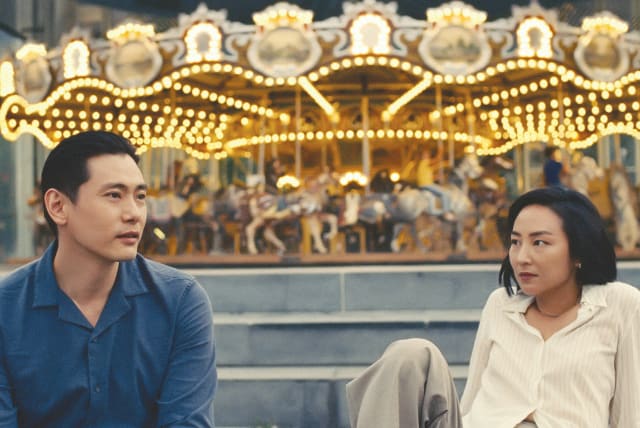‘Past Lives’: When childhood sweethearts reconnect - review

Past Lives teases the implications of a Korean concept called “in-yun,” something akin to the Jewish “bashert.”
Past Lives, which opens Thursday in theaters throughout Israel, is a pleasant arthouse romance about childhood sweethearts who reconnect later in life. It has moments of great beauty and sweetness, but feel overly restrained and cautious at times. Some moments that should be emotional high points play out as bland.
Directed by Celine Song, it generated great buzz after playing at the Sundance and Berlin film festivals last winter, and was a hot ticket at the Jerusalem Film Festival last month. Its popularity in all these speaks to a hunger among those who enjoy serious movies, to see a romantic film that isn’t relentlessly downbeat, as so many festival films tend to be, or mind-numbingly dull, like a conventional rom-com.
The Jerusalem Film Festival opens every screening with a short montage of clips from films in the festival that sets the tone for each event. This year’s montage began with a scene from Past Lives, in which Jung Hae Sung (Teo Yoo), a Korean engineer in his 30s arrives in a New York hotel room, opens the curtains, and looks out on a gray day in this big city. His very expressive face reflects his hope for this visit, that a romance he has dreamed of for years will flower.
A film on romance and childhood sweethearts
Past Lives teases the implications of a Korean concept called “in-yun,” something akin to the Jewish “bashert.” According to Nora (Greta Lee), the heroine of Past Lives, it is the way the universe reunites lovers who were together generations before, and the movie leaves it to us to figure out just how the concept fits into the story.
The film opens with Nora and her husband, Arthur (John Magaro), sitting in a hipster Brooklyn bar with Hae Sung. It’s all very friendly and civilized. Arthur tries out the little Korean he knows and Hae Sung struggles through a few phrases in English. But both of them are really there to be with Nora, who speaks both, and it’s not clear how she feels about each man.
PAST LIVES plays out in three timelines. The first is when the protagonists are about 12 and are attending school together in Korea. The young versions of Hae Sung (Leem Seung-min) and Nora (Moon Seyung-Ah), are friendly rivals. Nora gets the good grades and Hae Sung comes in second, until one day when he bests her.
She is annoyed, but the girl who dreams of winning a Nobel Prize for literature brushes it off, because, after all, she is moving to Canada soon. Their mothers encourage their friendship and even take them out on a combination between a date and playdate, but they assume that they will soon part forever.
But 12 years later – with the same actors from the opening bar scene playing the characters – Nora is living in New York and she notices that Hae Sung has been in contact with her father on Facebook. She gets in touch and soon they are chatting and having frequent video meetings.
He is in the army and has never been able to forget her. She remembers him fondly, but not with the same intensity, although when he playfully asks her what prize she is longing to win now – it turns out she’s set her sights on the Pulitzer – she realizes how much he remembers about her.
Already a successful playwright at 24, she isn’t quite ready for his intensity and isn’t willing to share her life with someone so remote from it, and breaks it off.
The movie then shifts to the present, when Hae Sung is a single engineer in Seoul. Although he knows Nora is married to Arthur, a fellow writer she met at a writing colony, Hae Sung decides to come to New York to see her. We can tell from the way he looks out the window in that hotel room scene that he is in love with her, or with the idea of her.
She has the inevitable awkward conversations with her husband about meeting up with her old schoolmate. Arthur refuses to be “the evil white husband, standing in the way of destiny.” He’ll get together with Hae Sung, and he is also willing to get out of their way.
The heart of the movie is a day Hae Sung and Nora spend together in New York, where they explore their feelings. You can see all the ways in which it is possible to love someone even if it doesn’t make sense for you to be with them.
It’s clear that Hae Sung has never stopped loving the assertive girl whom he fell for 20 years ago. He seems like a cautious guy who has always done what he was supposed to do, and for him going to see her is a grand gesture. Part of me was rooting for him to win her, but a flaw in the movie is that Nora is something of a cipher.
We learn she is a very driven, successful playwright, and hear that one of her plays is about an older, Korean woman. But we never get an idea of the tone of what she writes or why she is driven to create. Similarly, it wasn’t clear how much she and her husband care for each other, although there are clues that theirs is a genial but not passionate relationship. I couldn’t figure out how much Hae Sung’s visit was simply flattering to her and how much it really meant.
It’s fine for a movie not to spell everything out, in fact, it’s preferable. But in Past Lives, Nora’s opacity left me uninvolved at times. Was she just waiting for this earnest guy to head back to Seoul so she could have an artisanal beer with her husband and get back to work, or was she mentally packing her suitcase and composing a farewell letter? While everything looked perfect and lovely, I wasn’t sure how much Nora cared, and that made me care less.
Jerusalem Post Store
`; document.getElementById("linkPremium").innerHTML = cont; var divWithLink = document.getElementById("premium-link"); if (divWithLink !== null && divWithLink !== 'undefined') { divWithLink.style.border = "solid 1px #cb0f3e"; divWithLink.style.textAlign = "center"; divWithLink.style.marginBottom = "15px"; divWithLink.style.marginTop = "15px"; divWithLink.style.width = "100%"; divWithLink.style.backgroundColor = "#122952"; divWithLink.style.color = "#ffffff"; divWithLink.style.lineHeight = "1.5"; } } (function (v, i) { });

